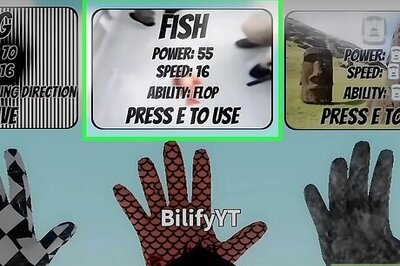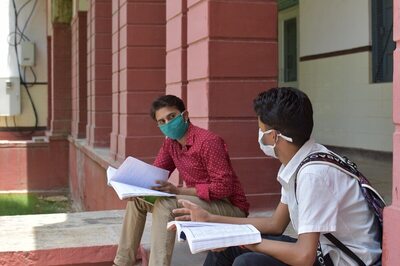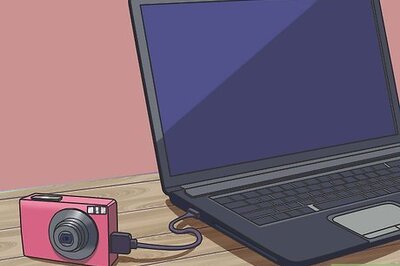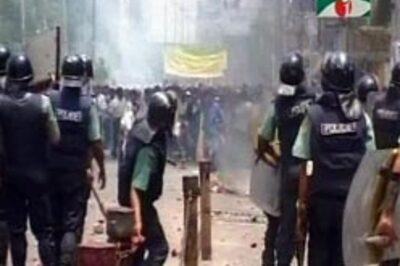
views
London: Key tactical battles for Saturday's Champions League final between Barcelona and Manchester United in London:
Who stops Lionel Messi?
The 23-year-old World Player of the Year has turned in a slew of brilliant performances in Europe's elite club competition in recent years, destroying teams including Arsenal and Real Madrid, with his pace and trickery.
Deployed mainly on the right wing earlier in his career, he has since taken a more central role and started to drop deeper into midfield to collect the ball.
The tactic has the effect of giving already hard-pressed midfielders extra work and drawing defenders out of position, leaving holes behind to be exploited by players such as David Villa, Pedro or Andres Iniesta.
United will have seen how Real Madrid have used centre-back Pepe as an extra defensive midfielder in a largely successful attempt to negate Messi's impact but manager Alex Ferguson is unlikely to upset his well-established patterns to copy that approach.
However, with his midfielders likely to be otherwise engaged, either Rio Ferdinand or Nemanja Vidic will have to step up to confront Messi in areas where the centre-backs usually prefer not to venture.
Vidic has been superb all season but if he has a weakness it is against speedy, close-controlling, small forwards. So the theoretically more mobile Ferdinand, who has struggled for fluidity all season, is more likely to be given the job.
The task will put a huge strain on the back four used to a flatter system and how they adapt to the ever-changing threat that Messi provides will be vital to United's prospects.
Chase all night or wait and strike?
Barcelona's midfield, marshalled by Spain playmaker Xavi, love to pass the ball and they are extraordinarily good at it.
In their semi-final first leg against Real Madrid at the Bernabeu, Barcelona had 72 per cent of possession, an impressive feat in the lair of their arch enemy.
At times, they appear to be toying with opponents. They pass and move brilliantly, and often instantly, but too often are allowed to do so unmolested.
Park Ji-sung, in particular, will see it as his personal mission to be in the face of any Barcelona player who has the ball, harrying and rushing him so that eventually one of those passes will go astray.
However, as others who have tried that approach before have found, it is exhausting work and extremely difficult to sustain for 90 minutes.
So United will have to find the balance of knowing when to press and when to stand back and say: "Well done, you've just completed 32 passes and advanced precisely nowhere".
Barcelona beware - United can score too
United have not progressed to their third Champions League final in four years by spending all their time worrying about the opposition - they can play a bit too.
They are at their best on the counter-attack, which is likely to be their approach on Saturday whether they want it that way or not.
If they stay patient and avoid conceding an early goal as they did in the 2009 final, United will have plenty of opportunities to get forward.
When they do, they are less concerned with creating neat patterns around the centre circle than with getting the ball forward to a striker in a dangerous position as quickly as possible.
Antonio Valencia has added real verve since his return from injury and though Ryan Giggs's 37-year-old legs might not cover the ground as they did a decade ago, his brain and feet still make him a potent creative force.
Wayne Rooney's gradual development into a deeper-lying threat and his partnership with razor-sharp Javier Hernandez complete an attack that not many teams have been able to keep at bay for long.
Rooney, Valencia and Hernandez are exactly the kind of pacy forwards able to expose Barca's relatively slow back four, although beating their in-form goalkeeper Victor Valdes in a one-on-one has proved elusive to many forwards.
Battle of the benches
United are likely to have an ideal combination on the bench with players to cover all areas in all circumstances.
Not many teams would be able to leave their league's joint-top scorer among the substitutes but that is where Dimitar Berbatov is likely to begin the night.
If United fall behind though or if Hernandez finds himself too shackled, then the Bulgarian with a touch of magic is the ideal man to come on.
Darren Fletcher, returning to fitness after a long illness absence, is the ready-made terrier who can replace Park or any other fading midfielder, whereas if something more creative is needed, they have Portuguese winger Nani itching to play.
Ferguson is also blessed to have John O'Shea - uncomplaining, unspectacular and often unnoticed, but a player who for 13 years has provided reliable cover across the whole back four.
Barca, by contrast, have a relatively thin squad and losing one of their starting 11 to injury or a red card would seriously disrupt their game plan.
Guardiola will have a number of promising younger players to call on if needed, including playmaker Thiago Alcantara, forwards Jeffren and Bojan Krkic and winger Ibrahim Afellay, while Seydou Keita has been effective at bolstering the midfield when brought off the bench.


















Comments
0 comment